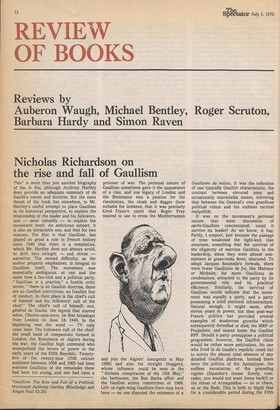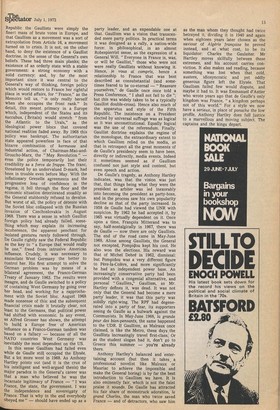Nicholas Richardson on the rise and fall of Gaullism
This* is more than just another biography of feu le Roi, although Anthony Hartley does provide an adequate summary of de Gaulle's career and" doctrine. But the main thrust of the book lies elsewhere, in Mr. Hartley's useful attempt to place Gaullism in its historical perspective, to explore the relationship of the leader and his followers, and — most valuably — to explain the movement itself. An ambitious subject, it is also an intractable one, and that for two reasons. The first is that Gaullism has played so great a role in French history since 1940 that there is a temptation, which Mr. Hartley does not always avoid, to drift into straight — and otiose — narrative. The second difficulty, as the author properly emphasises, is integral to Gaullism itself. The movement was essentially ambiguous, at one and the same time a fan-club and a political party. " Gaullism is a practice," a hostile critic wrote, "there is no Gaullist doctrine, there are no Gaullist convictions, no Gaullist line of conduct. In their place is the chief's cult of himself and his followers' cult of the chief." The chief's cult of himself: moi, general de Gaulle, the legend that started when, Charles-sans-terre, he first broadcast from London on June 18, 1940. In the beginning was the word — TV only came later. The followers cult of the chief: the small band of companions formed in London, the Resistance or Algiers during the war, the Gaullist high command who monopolised the levers of power in the early years of the Fifth Republic. Twentyfive of the twenty-nine UNR cabinet ministers between 1958 and 1965 had been wartime Gaullists; of the remainder three had been too young, and one had been a prisoner of war. The personal nature of Gaullism sometimes gave it the appearance of a clan, and one legacy of London and the Resistance was a passion for the clandestine, the cloak and dagger (how suitable for instance, that it was precisely Errol Flynn's yacht that Roger Frey wanted to use to cross the Mediterranean and join the Algiers' insurgents in May 1958) and also for straight thuggery, whose influence could be seen in the "thirteen conspiracies of the 13th May," the barbouzes, the Ben Barka affair and the Gaullist action committees of 1968. Leftor right-wing Gaullists there may have been — no one disputed the existence of a Gaullisme de milieu. It was the reflection of one typically Gaullist characteristic, the contrast between elevated aims and occasionally unavailable means, mirroring that between the General's own grandiose political vision and his ruthless tactical realpolitik.
It was on the movement's personal nature that most discussion of apres-Gaullism concentrated; could it survive its leader? As we know, it hap, Partly, I suspect, just because the passage of time weakened the tight-knit clan structure, something that the survival of the oligarchy of wartime Gaullists in the leadership, when they were almost nonexistent at grass-roots level, obscured. To adopt Jacques Soustelle's formula, there were fewer Gaullistes de foi, like Malraux or Michelet, far more Gaufiistes de combinaison, attracted to the party by its governmental role and its practical efficiency. Similarly, the survival of Gaullism would indicate that the movement was equally a party, and a party possessing a solid electoral infrastructure. Natural enough, it might seem, after eleven years in power, but then post-war French politics has provided several examples of mushroom growths which subsequently dwindled or died; the MRP or Poujadists, and nearer home the Gaullist RPF. Should a party presuppose a political programme, however, the Gaullist claim would be rather more ambivalent. No one who lived in de Gaulle's republic could fail to notice the almost total absence of any detailed Gaullist platform. Instead there were the politics of the Apocalypse, the endless excoriation of the preceding regime (Squealer's theme: Surely, comrades, you would not want Jones back?) or the threat of Armageddon — us or chaos, us or the Reds. This is both to imply that for a considerable period during the Fifth Republic the Gaullists were simply the finest mass of brute votes in Europe, and that Gaullism as a movement was a sort of extrapolation from Article 16, a movement turned on to crisis. It is not, on the other hand, to deny the existence of a Gaullist doctrine, in the sense of the General's own beliefs. These had three main planks; the existence of an orderly state with a stable government: a strong economy with a solid currency: and, by far the most important since it was central to the General's way of thinking, foreign policy which would restore to France her rightful place in world affairs, for " France," as the Memoirs tell us, "is only really herself when she occupies the front rank." In detail, this meant primacy in a Europe Which, independent of the States and its succubus, ( Britain) would stretch "from the Atlantic to the Urals," as the ideological power blocs that covered national realities faded away. By 1968 this policy was bankrupt. The authoritarian state appeared powerless in face of that bizarre combination of hermesse and industrial action, of Chairman-Mao-andGroucho-Marx, the "May Revolution" — even the police temporarily lost their credibility as a force de frappe. The franc, threatened by an undervalued D-mark, had been in trouble even before May. With the inflationary Grenelle agreements and the progressive loss of confidence in the regime, it fell through the floor and the economic situation deteriorated steadily as the General stubbornly refused to devalue. But worst of all, the policy of détente with the Soviet bloc collapsed with the Russian invasion of Czechoslovakia in August 1968. There was a sense in which Gaullist foreign policy had already failed, something which may explain its increasing incoherence, the apparent penchant for isolated gestures rarely followed through. De Gaulle rightly saw the Federal Republic as the key to "a Europe that would really be one," freed from intrusive American influence. Crudely, it was necessary to assimilate West Germany the better to control her. His first attempt to solve the German problem was by means of a bilateral agreement, the Franco-German Treaty of January 1963. The results were meagre, and de Gaulle switched to a policy of containing West Germany by going over her head, and working for a rapprochement with the Soviet bloc. August 1968 Made nonsense of this: and the subsequent financial crisis made it brutally clear, not least to the Germans, that political power had shifted with economic. In any event, as Alfred Grosser has shown, the attempt to build a Europe free of American influence on a Franco-German tandem was based on a fallacy — because of all the NATO countries West Germany was Inevitably the most dependent on the US.
In this sense Gaullism had failed even while de Gaulle still occupied the Elysee. But a lot more went in 1968. As Anthony Hartley points out (and it is the crux of his intelligent and well-argued thesis) the major paradox in the General's career was that a man who believed he was the Incarnate legitimacy of France — "I was France, the state, the government. I was the independence and sovereignty of France. That is why in the end everybody obeyed me" — should have ended up as a party leader, and an expendable one at that. Gaullism was a vision that transcended mere party politics. In practical terms it was designed as a rally, a nation-wide force: in philosophical, in an almost Robespierrist sense, as the expression of a General Will. "Everyone in France is, was, or will be Gaullist," those who were not were really Gaullists without knowing it. Hence, je vous at compris, hence a relationship to France that was best described as consubstantial (and sometimes feared to be co-eternal — " Reassure yourselves," de Gaulle once once told a Press Conference, "I shall not fail to die "; but this was widely taken to be a typically Gaullist double-cross). Hence also much of the apparatus and style of the Fifth Republic. The insistence on a President elected by universal suffrage was as logical as it was unconstitutional. Equally logical was the use of the referendum. Finally, Gaullist doctrine explains the regime of the monologue, the extraordinary extent to which Gaullism relied on the media, so that in retrospect all the great moments of de Gaulle's presidency seem to have been, directly or indirectly, media events. Indeed it sometimes seemed as if Gaullism confused not just style and content, but even speech and action.
De Gaulle's tragedy, as Anthony Hartley indicates, was that the vision was just that, that things being what they were the president as arbiter was led inexorably into becoming the president as party-boss, and in the process saw his own popularity decline as that of the party increased. In 1958 de Gaulle had viewed the UNR with suspicion. By 1962 he had accepted Pit, by 1965 was virtually dependent on it. Once upon a time, Francois Mitterand was to say, half-nostalgically in 1967, there was de Gaulle — now there are only Gaullists. The end of the road came in May-June 1968. Alone among Gaullists, the General not excepted, Pompidou kept his cool. He also won the elections. His reward was that of Michel Debre in 1962, dismissal: but Pompidou was a very different figure to Pere-la-Colere, and more significantly he had an independent power base. An increasingly conservative party had been provided with a congenial alternative, and personal " Gaullien." Gaullism, as Mr. Hartley defines it, was dead. It was not only that the General had become a mere party' leader, it was that this party was solidly right-wing. The RPF had degenerated into a party of fear, its supporters seeing de Gaulle as a bulwark against the Communists. In May-June 1968, la grande peur des bien-pensants, the same happened to the UDR. If Gaullism, as Malraux once claimed, is like the Metro, these days the Gaullists increasingly travel first-class. Or as the student slogan had it, don't go to Greece this summer — you're already there.
Anthony Hartley's balanced and 'entertaining account (but then it takes, a professional novelist like Malraux or Mauriac to achieve the impossible and make the General boring) is by far the best introduction to Gaullism we have. It is also eminently fair, which is not the faint praise it sounds. De Gaulle has attracted his fair share of moonstruck adoration, le grand Char/es, the man who twice saved France — and of detractors, who saw him
as the man whom they thought had twice betrayed it, dividing it in 1940 and again when eighteen years later chosen as the saviour of Alg6rie frangaise he proved instead, and at what cost, to be its liquidator: Charles the Gauleiter. Mr Hartley moves skilfully between these extremes, and his account carries conviction. It also makes sad reading, because something was lost when that cold, austere, idiosyncratic and yet oddly generous figure left the Elysee. That Gaullism failed few would dispute, and maybe it had to. It was Emmanuel d'Astier who wrote years ago that de Gaulle's only kingdom was France, "a kingdom perhaps not of this world." For a style we now have a serieux, in place of panache the low profile. Anthony Hartley does full justice to a marvellous and moving subject. The captains and the kings depart.























































 Previous page
Previous page